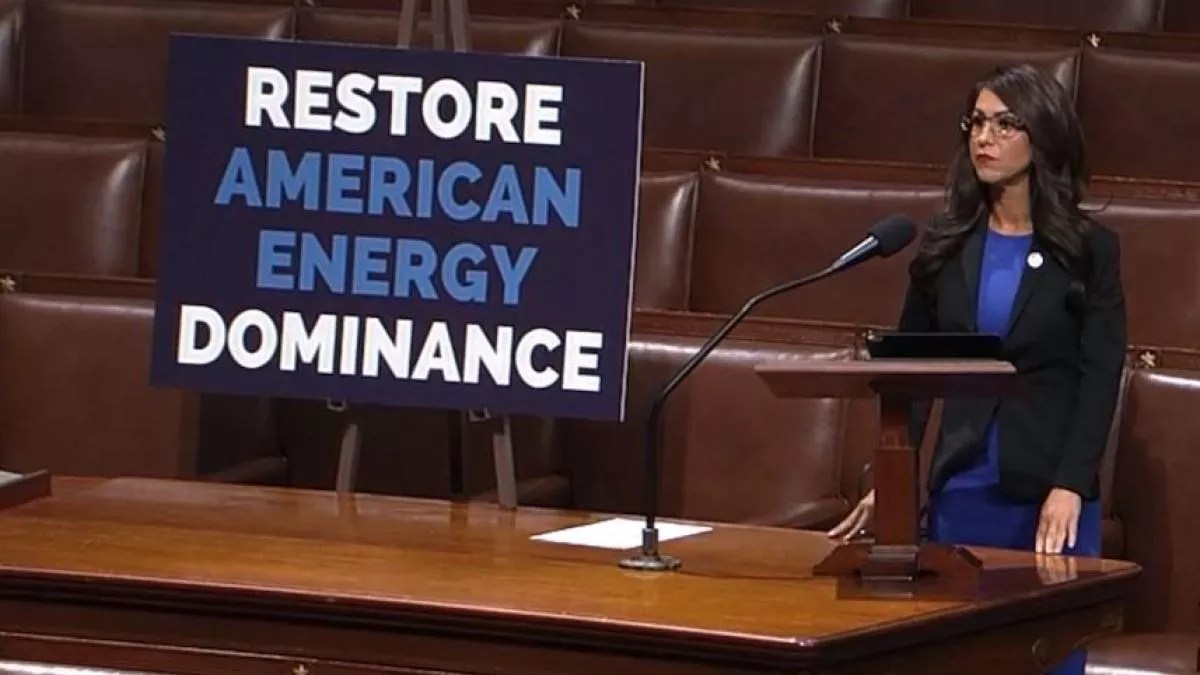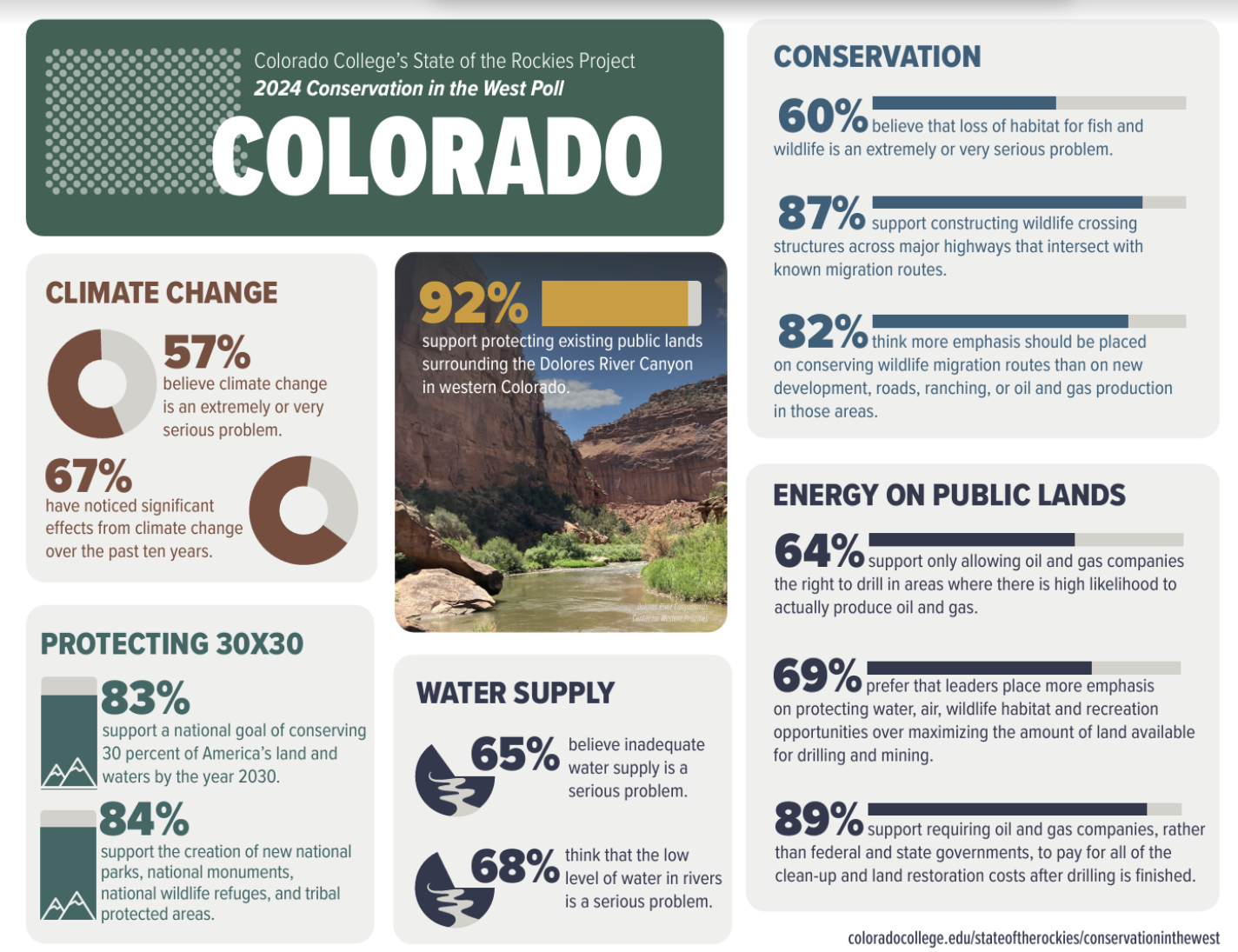
Office of Representative Lauren Boebert

Audio By Carbonatix
Representative Lauren Boebert says she has been in Washington, D.C., “fighting” for her constituents in Colorado’s 3rd Congressional District, while also raising money back home in the Centennial State for water and infrastructure projects in rural communities.
“We secured over $20 million for ten different projects through the House Appropriations process last summer, which I have proudly touted and voted for in subsequent single-subject appropriation bills,” Boebert tells Westword.
But not everyone has been buying what the congresswoman is selling on Capitol Hill.
Take her Restoring American Energy Dominance Act (HR 6009), for example, which has prompted more than 100 elected officials across the state to send a letter this week to leadership and members of the U.S. House of Representatives asking them to block the bill because they feel it doesn’t align with public interest.
“If passed, this harmful legislation would halt the Bureau of Land Management’s (BLM) Fluid Mineral Leases and Leasing Process Rule (“oil and gas leasing rule”), and would prevent the BLM from offering a substantially similar rule in the future,” says the letter, which is signed by nineteen mayors, ten senators and 26 state reps.
HR 6009 wound up passing Tuesday, March 20, in the House of Representatives. Its next stop will be a Senate committee hearing.
“This bill would shut down the BLM’s oil and gas rulemaking process where they’re updating and modernizing their management of oil and gas,” says Jim Ramey, state director for the Wilderness Society.
Ramey’s group is part of a separate coalition of local leaders and groups opposing another one of Boebert’s legislative darts, the Colorado Energy Property Act (HR 6547).
“We think it’s just really unfortunate that she has chosen to prioritize these things, which are contrary to the consensus and strong support of constituents in western Colorado who would like to see updated management of the BLM oil and gas program,” Ramey says of HR 6547.
HR 6547 is a piece of legislation that Boebert’s camp says “prohibits the Bureau of Land Management (BLM) from locking up 1.6 million acres of land in Colorado from responsible oil and gas production.” It received a hearing in the House Committee on Natural Resources on Tuesday morning, March 20, during which Boebert spoke about why she believes the bill would help, rather than hurt, Coloradans.

Rep. Lauren Boebert spoke to the House Committee on Natural Resources.
Office of Representative Lauren Boebert
“Colorado’s Western Slope used to have a booming energy economy. Unfortunately, we’ve been regulated into poverty by bad Democrat policies,” Boebert said. “I remember our booming economy because roughnecks used to come into my restaurant, and I knew I was having a good day when I would find mud on the floor from their boots. They were coming and patronizing my business and spending money there, but they were all forced out of our areas and onto other parts of America.”
According to Boebert – who is running for the CD4 seat this year after moving to the district in December – there used to be 112 rigs on the Western Slope. “Now we only have four drilling rigs,” she told the House Committee, blaming “not in my backyard” extremists and “job-killing policies” for driving away those “good-paying jobs.”
HR 6547 ultimately aims to block the Secretary of the Interior from implementing its draft management plans and receiving public input for the BLM’s Colorado River Valley and Grand Junction field offices. “It would take all of those good comments and feedback that the BLM has been working to get from municipalities, the cities and towns, the counties, tribal consultation, and throw it all out, which I think would be really unfortunate,” Ramey says. “So we’re hopeful that the committee will reject her bill and that the BLM will be able to finish their public process and finalize new management plans by taking all that public feedback into account.”
The coalition attacking HR 6547 is made up of supporters and organizations from across Colorado. A support packet sent to Westword by the conservation watchdog Wilderness Workshop shows individual letters sent by Democratic CD1 Congresswoman Diana DeGette, Colorado’s Department of Natural Resources and Department of Public Health and Environment, Eagle County, Pitkin County, City of Glenwood Springs, Town of Palisade, the Mountain Pact, the Colorado Food and Farm Alliance and nearly 85 local business in Western Colorado, among other groups, to the coalition recently.
“We’ve seen an overwhelming amount of support for the BLM in this process,” says Erin Riccio, advocacy director with Wilderness Workshop. “In Western Colorado, you’re seeing broad-based support bringing balance back. It’s an issue being politicized, but there’s people on both sides who are in these communities and on the ground who are coming together and are supportive of this type of direction that federal land management agencies are taking. So it seems like another instance where the congresswoman seems to be out of step with her constituents.”
Boebert says HR 6547 is a “necessary piece of legislation” aimed at protecting Colorado energy producers from “an outrageous land grab promoted by Joe Biden’s Bureau of Land Management.”
“Over 1.6 million acres of land would be locked up, freezing out our oil and gas industry and crushing our local economy, just to advance a radical agenda that puts Green New Deal politics ahead of working-class Coloradans,” Boebert says. “I won’t back down from fighting for my constituents and our energy producers who are a critical part of our state’s economy.”
Colorado is home to 3.7 million acres of public lands that are currently set aside for oil and gas drilling. The industry has a reported economic output of $2.3 billion, according to the BLM.
Supporters of the Oil and Gas Rule believe it will lead to improvements in conservation, recreation, renewable energy and “cultural connection” by opening up rulemaking concerning the future of public lands and making them more transparent.
“If [HR 6547] is successful, it will stop the planning process in its tracks, and it would leave the vast majority of these areas open to future oil and gas leasing,” Ramey says. “It would allow for continued increased greenhouse gas emissions, climate-damaging emissions, and we can’t afford to go down that road.”
Riccio tells Westword, “We would go back to the status quo. And the status quo is incredibly harmful from a climate perspective – and it’s also harmful for wildlife habitat, from a community standpoint, and also just building new, resilient economic opportunities for our communities.”
Conservation advocates point to the 2024 annual bipartisan Conservation in the West Poll as proof of the state’s overwhelming support for the Oil and Gas Rule and related efforts. The poll surveyed 400 voters in Colorado and found that 69 percent of residents prefer that leaders emphasize protecting water, air, wildlife habitat and recreation opportunities over maximizing the amount of land available for drilling and mining. However, it’s unclear how many of the voters who took part in the poll actually live in CD3 or on the Western Slope.

Conservation in the West Poll
Wilderness Workshop
“I don’t have that figure,” says Wilderness Workshop communications director Francis Sanzaro. “What I can say is that the support book is the best evidence of local support for a management plan that does not just let oil and gas do what they want.”
Sanzaro adds, “Boebert would not have the need to introduce this bill if increased conservation didn’t have the community support.”
While all of the BLM stuff has garnered the attention of Colorado officials, the congresswoman’s recent $20 million show of support for water and infrastructure projects in rural CD3 communities has been busy attracting the attention of social media users and national political offices, who have pointed out how she voted against the passage of the legislation providing the funds.
“Congresswoman Lauren Boebert voted against this funding,” the White House wrote in a March 20 X post as a reply to Boebert touting her efforts.
Congresswoman Lauren Boebert voted against this funding. https://t.co/qVzPDeTrt2
— The White House (@WhiteHouse) March 20, 2024
Speaking to Westword, the CD3 rep explains why she voted against HR 4366, aka the Consolidated Appropriations Act, which was signed into law on March 9 and is what’s ultimately allowing the money Boebert helped raise to go to CD3.
“After reforming the corrupt earmark system in January 2023 to bring more accountability and transparency to community projects, my office collaborated with local stakeholders across the 3rd District to request millions in funding for specific water and infrastructure projects in our communities,” Boebert says. “Unfortunately, the Uniparty pushed for a Swampy Omnibus bill that resembled so many of the CR’s and out-of-control spending practices that I promised my constituents I would strongly oppose. I voted ‘No’ and would do so again, but I’m proud that the funding my office requested for water and infrastructure projects in rural communities in Colorado will get to them and benefit my constituents.”
Boebert adds, “Those dollars would not have gotten to the 3rd District without my advocacy.”
This article was updated at 12 p.m. Friday, March 22, to fix errors about the status of HR 6009 and language in HR 6547.